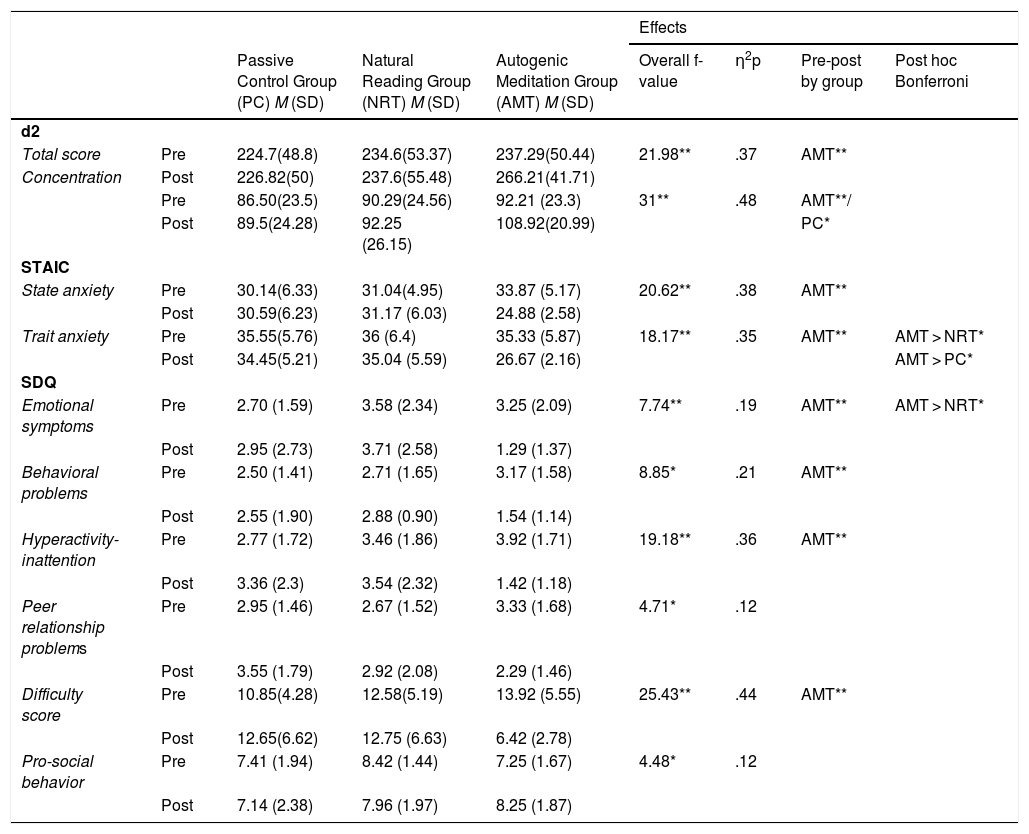This study examined the meditative approach of autogenic training in the context of attention state training. The evidence suggests that attention can be improved through attention state training, which includes meditation as a technique to focus and maintain attention. Some studies also indicate that attention state training promotes emotional and behavioral regulation. However, this issue needs further scientific evidence. This study aimed to test the efficacy of autogenic meditation training as a strategy to enhance attention, reduce anxiety, and promote a better mental health profile in children. Seventy Spanish students (Mage = 9.77, SD = 1.08 years) were randomly assigned to three conditions: autogenic meditation training, natural reading training (active control), and waiting list (passive control) conducted over a twelve-week period. Pre-post measures were collected for selective and sustained attention employing the d2 test; state and trait anxiety using the State-Trait Anxiety Inventory for Children; and a mental health screening compose of emotional symptoms, behavioral problems, hyperactivity-inattention, peer relationship problems, total difficulties index, and pro-social behavior with the Strengths and Difficulties Questionnaire. The results showed that children randomly assigned to autogenic meditation training experienced improved selective and sustained attention, reduced state and trait anxiety, and better general mental health than children randomized to natural reading training or a waitlist. Findings suggest that autogenic meditation training provides an acceptable approach to improving attention, reducing anxiety, and promoting a better mental health profile in children.
Este estudio examina el entrenamiento autógeno meditativo en el contexto del entrenamiento en estado de atención. La evidencia sugiere que la atención puede mejorarse a través del entrenamiento en estado de atención, que incluye la meditación como técnica para enfocar y mantener la atención. Algunos estudios indican también que el entrenamiento en estado de atención promueve la regulación emocional y conductual. Sin embargo, esta cuestión necesita mayor evidencia científica. El objetivo de este estudio es comprobar la eficacia del entrenamiento en meditación autógena como estrategia para mejorar la atención, reducir la ansiedad y promover un mejor perfil de salud mental en los niños. Los participantes de este estudio son setenta estudiantes españoles (M = 9.77, DT = 1.08) asignados aleatoriamente a tres condiciones: entrenamiento en meditación autógena, entrenamiento en lectura natural y lista de espera durante doce semanas. Para evaluar el efecto de entrenamiento se obtienen mediciones previas y posteriores en atención selectiva y sostenida; ansiedad estado y rasgo; y un cribado de salud mental compuesto de síntomas emocionales, problemas de comportamiento, hiperactividad-intención, problemas de relación entre iguales, índice total de dificultades y comportamiento pro-social. Los resultados muestran que los niños asignados al entrenamiento de meditación autógena experimentan una mejora de la atención selectiva y sostenida, una reducción de la ansiedad de estado y de rasgo, y una mejor salud mental general que los niños asignados al entrenamiento de lectura natural o al grupo de control pasivo. Los hallazgos sugieren que el entrenamiento en meditación autógena proporciona un enfoque aceptable para mejorar la atención, reducir la ansiedad y promover un mejor perfil de salud mental en los niños.










